- Home
- Edward Cline
SH04_Empire Page 11
SH04_Empire Read online
Page 11
Hugh nodded again to Speaker Robinson, and resumed his seat.
Behind Thomas Jefferson, a man clapped his hands once, and said to himself, “Hear, hear!” This gesture seemed to trigger a burst of commotion among the spectators. Jefferson turned to face the stranger, who merely smiled in challenge and said no more. Jefferson turned again to study the man with whom he had shared his thoughts over a supper.
The spectators were in a state of excitement. A minister remarked with bitter anger, “That man is pagan! Humility never fails to vanquish arrogance — in the eyes of God!”
“Perhaps,” answered a merchant next to him, “but only after one is dead, and what good would that do?”
“That fellow is capable of treason,” observed a lawyer.
“But not Parliament?” retorted his companion, another lawyer. “Who has been the persistent intruder: We, or that ‘greater House,’ sir?”
“It is merely somber raillery,” commented an instructor of the classics from the College to his wife. “You might have noticed that he insinuated the fate of Charles the First. That will cause him trouble!”
“He insinuated nothing,” replied his wife. “I like his manner. When one is being assaulted with rocks, one should not respond by tossing pasties!”
A dozen burgesses shot up instantly amid the commotion on the benches. Speaker Robinson, sitting rigidly in his high-backed chair, did not know whom to recognize first. John Randolph, whose duty it was to gavel the House into order, was so stunned that he sat fixated on the empty space next to the gavel: a ritual had been overlooked in the haste to finish the business of the documents; the gold-plated mace of the House still rested under the clerks’ table, when over an hour ago it should have been returned to its place on the black-cloth table to signify a formal session. He silently but angrily reproved one of his clerks, nodding to the empty space. The clerk rose and retrieved the mace, and laid it on the table. Only then did Randolph hear the desperate tapping of a cane, and with a blink looked at Speaker Robinson. He picked up the gavel and struck it several times on an oaken anvil, shouting, “Order in the House! Order in the House!”
Speaker Robinson stared resolutely into space, refusing to look at anyone, waiting for the burgesses to obey the gavel. Over a long minute, the noise abated; one by one the standing members resumed their seats. When he was satisfied that the House had regained its dignity, Robinson, with a quick scowl at Hugh Kenrick, said, “What say anyone to that…reprimand?”
Again, several burgesses rose, and the Speaker nodded to one. The others fell back into their seats. The recognized burgess said, “In reply to that member’s remarks, I say that any correspondence with the stewards of the British Empire must conform to language commensurate with the occasion, and strive to reply in kind — not in the rude parlance of vagabonds and ruffians!”
“Hear, hear!” murmured several men on the benches. The burgess sat down with a smug, triumphant smile.
Colonel Bland was recognized. “In rebuttal to that member’s contention, I say that bellicose words merely invite bellicose actions. One witnesses that phenomenon often enough outside the less congenial taverns and public places in this town and throughout the colony. And, I might note, in the histories of nations! We owe our mother country civility, and the respect due her.”
Speaker Robinson acknowledged several more burgesses, all of whom he knew would speak against the rebellious member’s remarks, and who did. Then the tall, commanding figure of Colonel Washington rose. Robinson knew that he could not deny this man his words and, out of respect, nodded to him.
Washington did not often speak in the House, and a special silence subdued the chamber as its occupants listened to the hero of the late war. “My attachment to civility and poise on all occasions is well known to this House, and frequently the subject of humor among certain of my colleagues. But, while I cannot fully agree with that member’s sentiments on how best to protest the mischief at hand in London, I do believe that we may in time be civil to a fault and to our egregious disadvantage.” Washington resumed his seat.
This surprising speech produced its own silence. Speaker Robinson pursed his mouth in regret. George Wythe sat staring at Washington, his eyes wide in shock. The burgesses who spoke against Hugh Kenrick sniffed in mortification. Thomas Jefferson regarded Washington with newfound awe. Edgar Cullis glanced in confusion at his colleague. Patrick Henry beamed.
And Hugh felt partly vindicated. He nodded in thanks to Washington across the space that separated them. Washington nodded imperceptively in acknowledgment.
Peyton Randolph, Edmund Pendleton, and Colonel Bland observed the silent communication, and made mental note of it.
Speaker Robinson took advantage of the hiatus. He tapped his cane once on the floor and announced, “The House is now closed to debate.” He waved the cane at the clerks’ table. “Mr. Randolph, please proceed with the vote.”
The remonstrance was passed unanimously.
* * *
When he left the Capitol that evening and stepped out into the creeping dusk and chill, it was with a sense of accomplishment, even though the address, memorial, and remonstrance were repugnant to his principles. He was certain that they would prove to be futile, and perhaps even achieve the opposite of their purpose. Wythe’s clerks were busy now and would work late into the night making copies of the documents for dispatch to several points: to the Virginia Gazette for publication; to interested parties in the lower houses of the Pennsylvania and Massachusetts legislatures; to London and the king, Parliament, the Board of Trade; to James Abercromby and Edward Montague. When he returned to Mary Gandy’s house this evening, he would make his own copies of the documents; he had heard them read so many times over the last few weeks that their words were burned into his memory.
Outside the Capitol, Thomas Jefferson stopped to compliment Hugh on his speech. “That, sir, was drama!” he exclaimed. Other burgesses stopped to admit to him that they, too, were dissatisfied with the documents’ wordings, and confessed that they lacked the presence of mind to raise their own objections.
Edgar Cullis, on his way to supper at the Raleigh Tavern with several of his friends, sent his company on so that he could speak for a moment in private with his colleague. “Well, sir, you won’t be snubbed in the future! I will wager on it! What a maiden speech! What you tend to say often gives me the shivers, I don’t mind admitting it, but you may be right. And, God! What a stir you made! Randolph, Pendleton, Robinson, Bland, Wythe — he wrote the remonstrance, you know, and Bland the others — well, they are all in a royal pet! You’ve made no friends in that company, sir, but Colonel Washington practically seconded you, and that will count for something among them.” He paused. “Do you truly believe the style will make a difference?”
Hugh sighed. He was tired. He answered. “A proper, assertive style may have stayed Mr. Grenville’s hand, or at least given him grave pause for thought. The adopted style, however, will either provoke or entice him and his party.” Hugh patted his colleague’s arm and hoped he did not sound condescending. “Surely, Mr. Cullis, you know that as bees are lured by the pollen of flowers, bullies are drawn by the funk of the timid!”
“Well put, sir,” remarked Cullis. He laughed. “I am sure that if you had pronounced that maxim in the chamber, an even greater altercation would have occurred!” He paused. “Will you join me and my friends at the Raleigh?”
Hugh shook his head. “I am going directly to your cousin’s. I have personal business to see to. And it has been a trying day. Thank you for the invitation.”
After a brief exchange with Hugh on the House’s remaining business, Cullis bid his colleague goodnight and rushed away down Duke of Gloucester Street. A cold wind rustled the trees nearby and caused the flames of the Capitol’s cressets to whip nearly horizontally. Hugh buttoned up his long cloak, drew it closer around him, and turned to leave the Capitol grounds.
“A word with you, sir,” said a voice behind him.
> Hugh turned and saw a man he had noticed earlier among the spectators in the House, in idle conversation while he listened to the clerk read the memorial to Lords. The man had a distinctive Roman character to his face, like one he had admired in a book of engravings in his library. As he came into the light of the cresset, Hugh saw that he wore a black cloak and a hat with a round brim. “Yes…?” answered Hugh.
The man approached and held out his hand. “I am Patrick Henry, of Hanover. I wish to commend you on your brave speech — and to thank you for one other thing.”
Hugh took the proffered hand and shook it. “Thank you, sir. And what is it that you have to thank me for?”
“For helping me make up my mind.”
“About what?”
Henry dug his hands into the pockets of his cloak. “I have for some time entertained the ambition of standing for burgess for the next session. You have helped me decide that I must follow that ambition.”
“How so, sir?”
“I had some business here in the House last month, and went home after it was done — though not to my satisfaction.”
Hugh remembered what young Jefferson had told him. “Oh, yes. The Dandridge and Littlepage matter.”
“Yes,” said Henry. “Well, that was more a favor for a friend than a serious case. I half expected my client’s suit to be dismissed, though not with the airs I smelled in that committee. But, here is my main point. I learned at that time that the House was proposing to act on information received from the House’s agent in London about the new taxes. I resolved then to return here to see for myself what would be done. I would rather have stayed in Hanover with my family and friends, but I journeyed here and attended all the debates on the papers to be sent to London. And, until you spoke, I thought I had wasted my time.”
Hugh shook his head. “I spoke but a minute, sir.”
Henry took a hand from his cloak and raised a finger. “But that one minute, sir, and what it precipitated, revealed to me certain aspects and habits of the House, and convinced me that certain things were possible. So — and I will not take up much more of your time, Mr…. ?”
“Hugh Kenrick, of Queen Anne County and Meum Hall therein.”
“…Mr. Kenrick — I shall enter politics here. I shall contrive to be elected burgess, either of Hanover or some neighboring county. There are vacancies expected. I shall realize my ambition because I agree with you that these encroachments on our liberties, such as a captive freeman’s are, must be resisted. I agree that the encroachers must know they are observed and opposed. Forgive me for having overheard what you said to your friend a minute ago, about the bees and bullies, but if I had had the privilege of speaking to the House, that is what I would have said to it, at the risk of censure, expulsion, and even a program of duels with the offended!”
Hugh laughed for the first time in days. He took his hands from his own pockets and grasped the man’s shoulders. “You, sir, are of my own mettle! I have endured censure, expulsion, and even fought a few duels, all in the same spirit!”
Henry smiled. “I wish the word had a positive connotation, sir, but you flatter me. Whether my efforts will result in a Thermoplyae or a Marathon, I cannot predict.” He glanced once at the Capitol behind him. “There is a great weight of ballast to be moved in there.”
Hugh’s face expressed surprise at the classical references. But he said, “If you are successful in your election, Mr. Henry, I hope to work with you in the next session, and together we may move it.”
Henry grunted in amusement. “Do you see, Mr. Kenrick? Even ‘backwoodsmen’ such as myself peruse the histories and wisdom of Rome and Greece. That material is not the exclusive preserve of these Tidewater grandees.” He gestured contemptuously in the direction of the Capitol, then his brow furled in curiosity. “You are not a native of these parts, are you, Mr. Kenrick? Your manner and modulation of speech are distinctly…English.”
Hugh said simply, “I removed here from Dorset and London, but count myself a Virginian.”
“I see,” said Henry. “Well, being English is not necessarily to your discredit, nor is your youth. When we have more time, you must relate to me your experiences with censors and expulsion. I am sure it is the stuff of epics.”
Before Hugh could protest the compliment, Henry said, “But here is one more point I wish to make, and then I take my leave. I am sure that you made the same observation I did, that as the end of the session nears, attendance in the House diminishes.”
“Yes,” said Hugh. He had noted it. “But what importance do you attach to it?”
Henry cocked his head. “You would have thought that with such an important matter as a protest to the Crown in the making, the House would have boasted full attendance. But the lazy and the thoughtless and the ignorant departed, resulting in less than half a House.” Henry smiled mischievously. “Keep that fact in mind, sir. I presume that the phenomenon is a regular one and will recur next year. It may be used to advantage. The lazy and the thoughtless and the ignorant can claim no say to the direction of events they choose to absent themselves from.”
“They are another kind of ballast,” remarked Hugh.
“Precisely,” said Henry. “You must know that at this time last year, I wrung an extenuate defeat in the Maury suit in Hanover. That has brought me some notoriety. You have scored a similarly curious defeat here today, sir. Perhaps at the next session, we can pool our defeats and attain a genuine victory.” He took Hugh’s hand and shook it again. “Good night to you, sir, good health, and thank you for your time and inspiration.” With a touch of his hat, Patrick Henry turned, shoved his hands into his pockets, and strode in the direction of the Blue Bell Tavern.
Hugh watched him disappear into the darkness. Another gust of wind blew against his back, whipping the yellow flames of the cresset behind him and sending a shower of glowing sparks to dance in the wake of the man with the Roman countenance.
The General Assembly adjourned on the 21st of December, and would meet again on the first day of May the next year.
Chapter 10: The Purgatory Tavern
The tread wheel was fixed to a wall at a man’s height, a few feet from the roaring oven-fireplace. It was a sturdy wooden and tin drum with bars in which was imprisoned the turnspit, a small mottled mongrel dog, which had little choice but to trot in the contraption. It could not stop to rest, for the sharp curve of the tread wheel did not lend itself to a dog’s comfort. If by chance it did stop and lay down to rest, however uncomfortably, the serving boy attending the fireplace would jab it with a poker to get it moving again. The dog might yelp, or whine, or bark, or perhaps even growl in torment, but it would obey. It had no choice. The tread wheel was rigged to a series of pulleys that turned the iron bar of the spit, on which were impaled joints of beef, swan, and lamb. These were turned over the flames by the dog’s exertions, assuring that all sides of the meat were evenly roasted. The tread wheel could be disengaged from the pulleys to allow removal of the cooked meat. These occasions were frequent enough when Parliament was in session and the number of hungry patrons tripled, so that the dog could enjoy a succession of brief respites from its duty.
Its home was the Purgatory Tavern, one of half a dozen such establishments in the Old Palace Yard, Westminster, to which members of Parliament, civil servants, and other functionaries repaired during recesses of the sessions. The Purgatory was also patronized by lawyers with business at the King’s Bench and the Court of Common Pleas in nearby Westminster Hall, or in the Court of Requests, a kind of small claims court that adjudicated debts of five pounds or less, just behind the tavern. The Purgatory was conveniently connected to St. Stephen’s Chapel, or the Commons, by a narrow passageway between the Court of Requests and the backs of other buildings. Up the Yard were the Caesar’s Head Tavern, the Ship Tavern, Waghorn’s Coffeehouse, and the Office of Ordnance. Adjoining the latter was what resembled a severely abbreviated Greek temple, which was the king’s own entrance to the gabled lobby of
the House of Lords. Across the Yard were various shops and merchants’ offices, a constable’s house and jail, a minor magistrate’s house and office, solicitors’ offices, and St. Margaret’s Church, not much larger than a Nonconformist Chapel. Looming over it all on one side was the long sloped roof of Westminster Hall, and on the other, the ancient mass of Westminster Abbey, more commonly known then as St. Peter’s Abbey or Collegiate Church.
A fresh February snow had fallen overnight and covered the roofs of all these edifices. It was already gray with the soot that also fell from the effluvium of London’s countless chimneys, so that it was difficult to distinguish the rooflines from the winter sky. Before noontime, though, it had warmed up a little, and the broad cobblestoned ways of the Old Palace Yard and the New Palace Yard became lakes of slush. The thick, soaking mire hardly arrested the bustle of pedestrians as they hurried behind the stanchions that defined the “sidewalks”; the cold drove them on, as did the fear, too often realized, that they would be daggled with muddy slush from passing carriages, or splashed by the synchronized pumping feet of porters bearing sedan chairs.

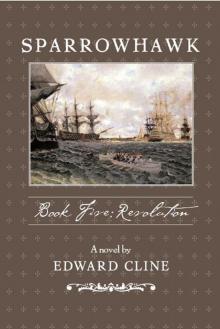 Revolution
Revolution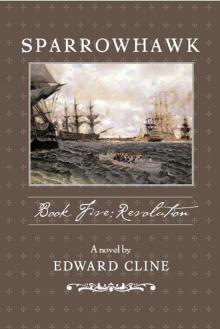 SH05_Revolution
SH05_Revolution War
War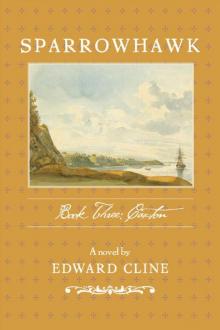 SH03_Sparrowhawk: Caxton
SH03_Sparrowhawk: Caxton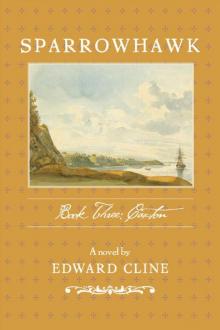 Sparrowhawk III
Sparrowhawk III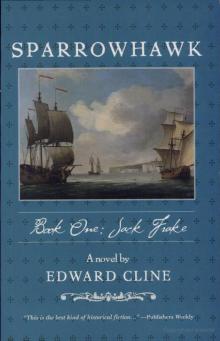 Jack Frake
Jack Frake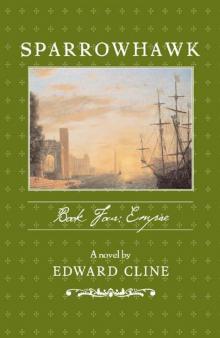 SH04_Empire
SH04_Empire Empire
Empire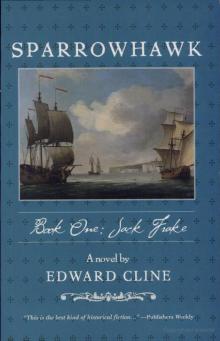 SH01_Jack Frake
SH01_Jack Frake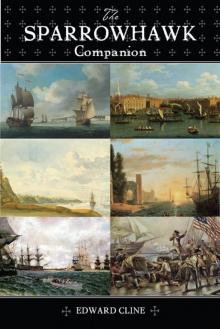 The Sparrowhawk Companion
The Sparrowhawk Companion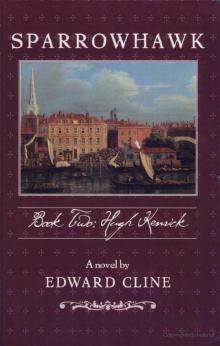 Hugh Kenrick
Hugh Kenrick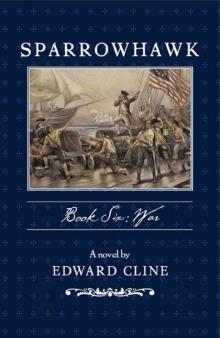 SH06_War
SH06_War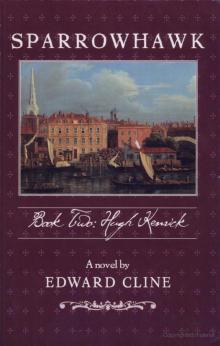 SH02_Hugh Kenrick
SH02_Hugh Kenrick